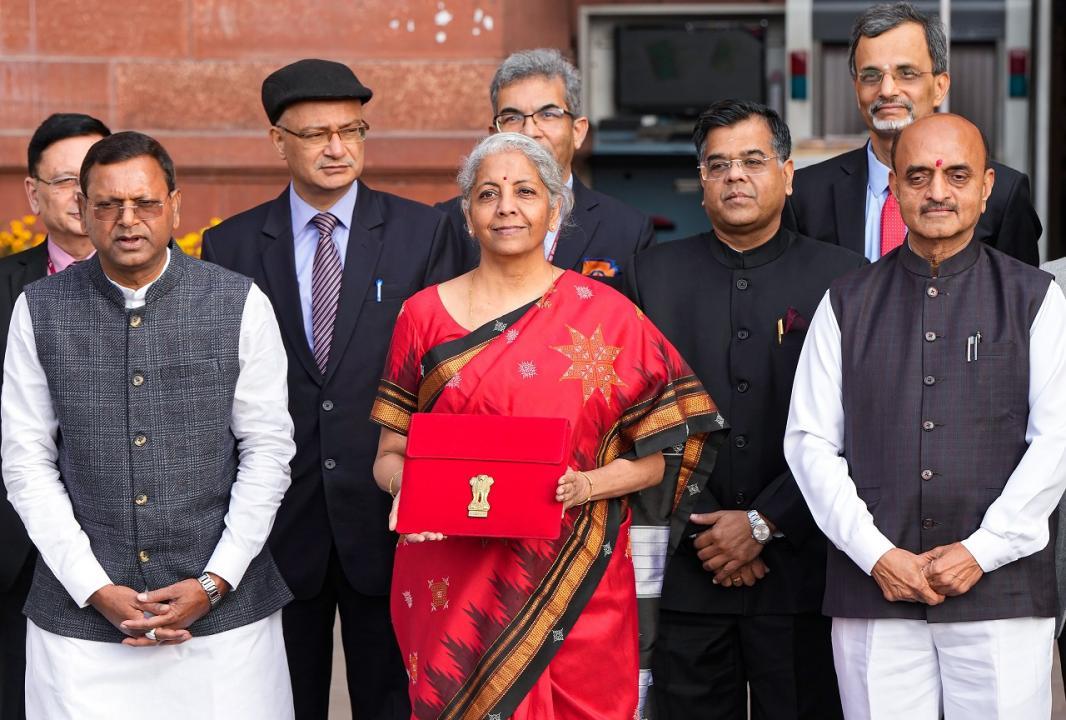Mumbai-based civic activist believes the new tax regime would eventually end the habit of saving, but industrialists see it as an opportunity for investment in safe assets, like home

Union Finance Minister Nirmala Sitharaman. Pic/PTI
On Wednesday, Union Finance Minister Nirmala Sitharaman made five announcements related to personal income tax while delivering her fifth consecutive Budget speech. This aspect was untouched when she tabled the Budget last year.
ADVERTISEMENT
A civic activist told mid-day the new tax regime would erase the idea of savings from the minds of future generations. The industrialists, however, believe it would lead to more investments and increase consumption.
Tax regime
The government appears to lure taxpayers to opt for the new tax regime, which has failed to gain popularity since being introduced in Budget 2020, said Nikhil Desai, a city-based civic activist. Sitharaman announced a raise in personal income tax rebate to Rs 7 lakh from existing Rs 5 lakh. However, deductions, investments or expenditure, like under PPF and HRA, aren’t applicable in the new tax regime.
“This government is creating a new generation that will give up the habit of saving ultimately. While the rich don’t care about this as they have more than enough, the poor have no option; ultimately, it’s the middle class that will be affected the most,” Desai added.
Also Read: Budget 2023: FM’s Pathaan and PM’s Tiger deliver box-office budget
Real estate
Dr Niranjan Hiranandani, MD at Hiranandani group and national vice chairman at NAREDCO, said, “The capital expenditure outlays in infrastructure up to Rs 10 lakh crore, nearly 3.3% of GDP, will have a multiplier effect on real estate asset classes, like residential, commercial, industrial and logistics sectors. Incremental Pradhan Mantri Awas Yojana allocation up to Rs 79,000 crore will give impetus to affordable housing and benefit a wide segment of homebuyers. Rebates in personal tax will permit additional disposable income in the hands of the discerning homebuyers.”
Anil G Verma, executive director and CEO at Godrej & Boyce, called it a “balanced and inclusive budget that will provide further impetus to growth.”
“The renewed thrust on investment in infrastructure will drive the productivity of our economy and generate employment. Our competitiveness in the global economy will also improve through the thrust on research in fields like 5G services, AI and agriculture. Together, with the initiatives to reduce the compliance burden and de-criminalise several regulatory provisions, it will improve the ease of doing business in India and attract fresh investments. Measures to improve rural incomes and reduce personal income tax rates will deliver more disposable income in the hands of people, driving consumption,” Verma added.
Green growth
Madhav Pai, interim CEO at WRI India and program executive director at Sustainable Cities and Transport, said, “The allocations for energy transition, emphasis on battery storage and green credit announcement offers encouragement for the environmental sector... We are yet to see the details of how some of this will pan out, particularly the green credit programme, but we are headed in a positive direction.”
Subrahmanyam Pulipaka, CEO at National Solar Energy Federation of India, said, “We believe the provisions in this budget will help accelerate our transition to green energy, green mobility, green fuels and increase green jobs in India”.
Mr Abhijit Bhattacharya, founder and CBO at OneGreen, said, “Tax exemptions such as the reduction of GST rates on electric vehicle components and waivers or subsidies to households using renewable energy systems will contribute greatly towards creating an environment-friendly infrastructure.”
FinTech
Saurav Ghosh, co-founder at Jiraaf, said, “Budget 2023 carves out an excellent path for the future with a focus on the growth of MSME sector, pushing infrastructure development, and enabling personal consumption. The finance minister has taken substantial steps to reduce credit costs for the sector, which would promote growth, boost profitability and create more jobs.”
Electric Vehicles
Varun Goenka, CEO and co-founder at Chargeup, said, “The outlay of R35,000 crore for priority capital investments towards energy transition and net-zero goals will boost energy security in India... One of the most impactful decisions is the customs duty exemption on import of capital goods and machinery required to produce lithium-ion batteries for EVs in India. This will reduce the initial capital investment manufacturers need and likely make batteries cheaper.”
Tushar Choudhary, founder and CEO at Motovolt Mobility, said, “The scheme announced to scrap old vehicles and replace the old polluting vehicles will encourage more people to switch over from petrol/diesel cars to EVs.”
 Subscribe today by clicking the link and stay updated with the latest news!" Click here!
Subscribe today by clicking the link and stay updated with the latest news!" Click here!







